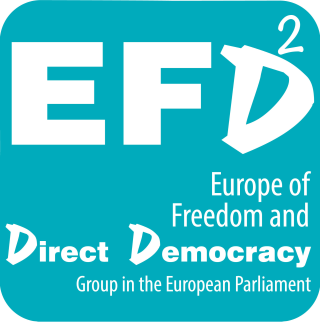
The European People's Party Group is a political group of the European Parliament consisting of deputies (MEPs) from the member parties of the European People's Party (EPP). Sometimes it also includes independent MEPs and/or deputies from unaffiliated national parties. The EPP Group comprises politicians of Christian democratic, conservative and liberal-conservative orientation.

Union for Europe of the Nations (UEN) was a national-conservative, Eurosceptic political group that operated in the European Parliament between 1999 and 2009. At its height in February 2008, it had 44 MEPs. UEN was affiliated with the Alliance for Europe of the Nations political party.

The Civic Democratic Party is a conservative and economic liberal political party in the Czech Republic. The party sits centre-right on the political spectrum, and holds 34 seats in the Chamber of Deputies, and is the second strongest party by number of seats following the 2021 election. It is the only political party in the Czech Republic that has maintained an uninterrupted representation in the Chamber of Deputies.

The 2004 European Parliament election was held between 10 and 13 June 2004 in the 25 member states of the European Union, using varying election days according to local custom. The European Parliamental parties could not be voted for, but elected national parties aggregated in European Parliamental parties after the elections.

The European People's Party (EPP) is a European political party with Christian democratic, liberal-conservative, and conservative member parties. A transnational organisation, it is composed of other political parties. Founded by primarily Christian-democratic parties in 1976, it has since broadened its membership to include liberal-conservative parties and parties with other centre-right political perspectives. On 31 May 2022, the party elected as its President Manfred Weber, who was also EPP's Spitzenkandidat in 2019.

The CDS – People's Party is a conservative and Christian democratic political party in Portugal. It is characterized as being between the centre-right and right-wing of the political spectrum. In voting ballots, the party's name appears only as the People's Party, with the abbreviation CDS–PP unchanged.

The Hungarian Democratic Forum was a centre-right political party in Hungary. It had a Hungarian nationalist, national-conservative, Christian-democratic ideology. The party was represented continuously in the National Assembly from the restoration of democracy in 1990 until 2010. It was dissolved on 8 April 2011.

The European Democratic Party, also known as the European Democrats, is a centrist European political party in favour of European integration.

The political groups of the European Parliament are the officially recognised parliamentary groups consisting of legislators of aligned ideologies in the European Parliament.

Jan Zahradil is a Czech politician for the Civic Democratic Party (ODS) who had been Member of the European Parliament (MEP) from 2004 to 2024. Zahradil also served as Member of the Chamber of Deputies (MP) from 1998 to 2004.

The Alliance for Europe of the Nations was a European political party that gathered conservative and national-conservative political parties from across the continent.
European Democrats may refer to:

The Movement for European Reform, abbreviated to MER, was a pan-European alliance of national centre-right political parties with conservative, pro-free market and Eurosceptic inclinations. It consisted of the Conservative Party of the United Kingdom and the Civic Democratic Party of the Czech Republic.

The 2009 European Parliament election was held in the 27 member states of the European Union (EU) between 4 and 7 June 2009. A total of 736 Members of the European Parliament (MEPs) were elected to represent some 500 million Europeans, making these the biggest trans-national elections in history. An additional 18 observers were pre-elected.

The 1994 European Parliamentary election was a European election held across the 12 European Union member states in June 1994.

The Group of the Alliance of Liberals and Democrats for Europe was the liberal–centrist political group of the European Parliament from 2004 until 2019 when it merged into Renew Europe.

Europe of Freedom and Democracy (EFD) was a far-right, Eurosceptic political group that operated in the European Parliament from 2009 to 2014. It was composed of 34 MEPs and it existed during the European Parliament's 7th and 8th terms. After 2011, EFD had a loose relationship with the Movement for a Europe of Liberties and Democracy political party.

The European Conservatives and Reformists Group is a soft Eurosceptic, anti-federalist political group of the European Parliament. The ECR is the parliamentary group of the European Conservatives and Reformists Party European political party, but also includes MEPs from other European parties and MEPs without European party affiliation.

The European Conservatives and Reformists Party, formerly known as Alliance of European Conservatives and Reformists and Alliance of Conservatives and Reformists in Europe, is a conservative, soft Eurosceptic European political party with a main focus on reforming the European Union (EU) on the basis of Eurorealism, as opposed to total rejection of the EU (anti-EU-ism).

Europe of Freedom and Direct Democracy was a Eurosceptic and populist political group in the European Parliament. The EFDD group was a continuation for the Eighth European Parliament of the Europe of Freedom and Democracy (EFD) group that existed during the Seventh European Parliament, with significant changes to group membership.

















